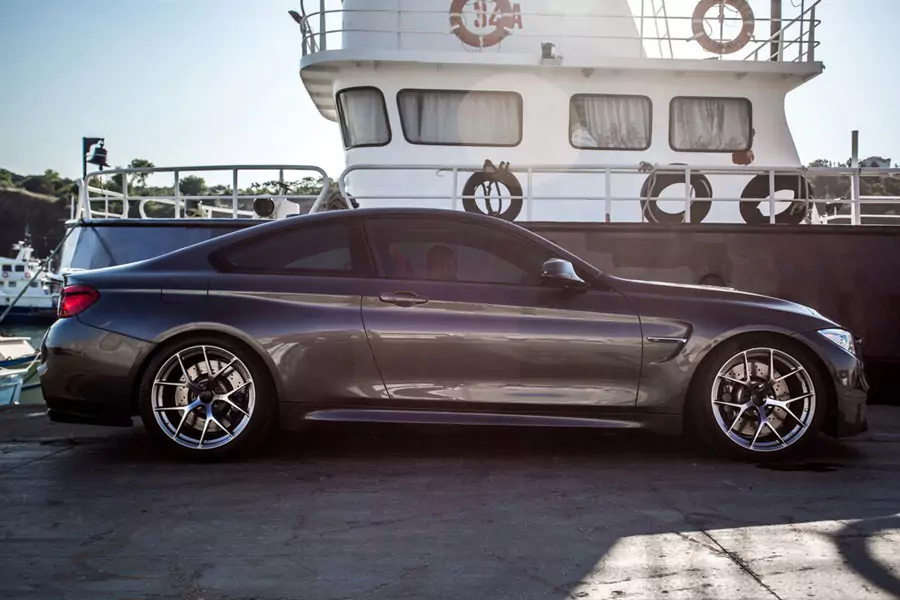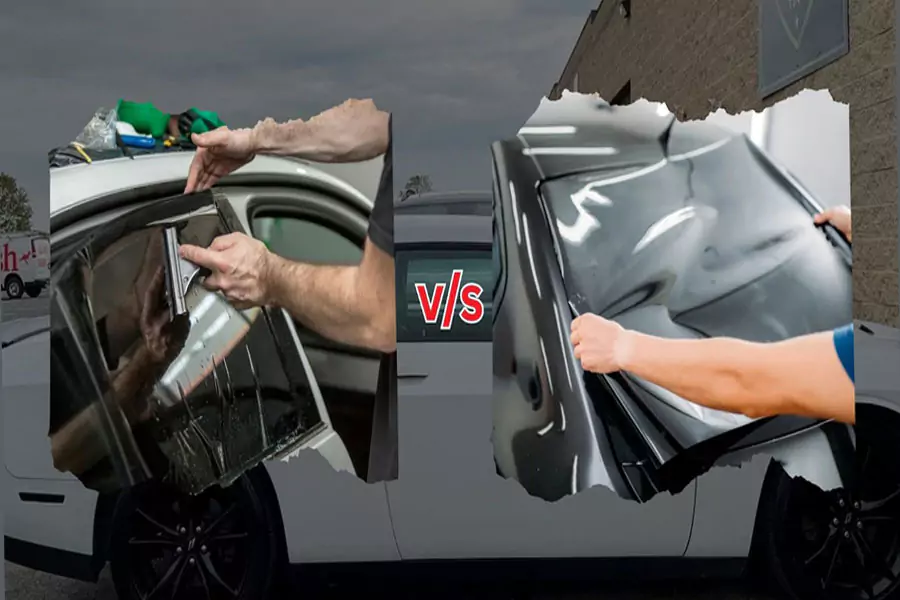Window tinting is not just a style upgrade, but it’s a functional investment that can protect your car’s interior, improve comfort, and safety. There are lots of choices available when it comes to choosing tint, and deciding which is best for your car is not easy. But don’t worry. We are going to help you through this informative and engaging blog post. Here, we are going to talk about some of the most popular choices – ceramic, dyed, and carbon window tints with their unique benefits, costs, and performance levels.
Understanding Carbon Tint, Dyed Tint, and Ceramic Tint
Before comparing, let’s understand what each tint type is:
- Dyed Window Tint – The most basic and affordable type, dyed tint uses a layer of dye between adhesive and protective layers. It darkens your windows primarily for privacy and style but offers limited heat rejection.
- Carbon Window Tint – Carbon tint contains carbon particles that help block infrared light, reducing heat without fading over time. It offers better performance than dyed tints but usually at a higher cost.
- Ceramic Window Tint – The premium option, ceramic tint contains non-metallic ceramic particles that block UV rays and infrared heat exceptionally well while allowing clearer visibility. It’s the most advanced and durable tint option available today.
Benefits of Carbon Tint, Dyed Tint, and Ceramic Tint
Each tint type has its own advantages:
Benefits of Dyed Tint
- Affordable option for basic shading and privacy
- Gives your car a sleek, stylish appearance
- Blocks some UV rays (though not as much as higher-end tints)
Benefits of Carbon Tint
- Blocks more heat compared to dyed tints
- Won’t fade over time like dyed films
- Adds a matte, non-reflective finish for a modern look
Benefits of Ceramic Tint
- Superior UV and infrared light rejection
- Doesn’t interfere with electronic signals (unlike some metallic tints)
- Improves comfort by significantly reducing cabin heat
- Maintains high clarity even with darker shades
When to Use Ceramic Tint?
Ceramic tint is ideal for:
- Hot climates where heat rejection is a priority
- Luxury vehicles where performance and aesthetics are equally important
- Drivers sensitive to glare since ceramic tint reduces sun glare effectively
- Harmful UV rays protection during long drives
If you value maximum performance, comfort, and durability, ceramic is worth the investment. You can easily get premium Ceramic tints for your car in Philadelphia from Tint IQ 360.
When to Use Carbon Tint?
Carbon tint works best when:
- You want good heat reduction, but don’t want to spend top dollar
- You prefer a matte finish instead of glossy.
- You live in a location with mild sun exposure.
- You prefer a film that will last for a long time and will not fade like dyed tints.
Carbon is between affordability and performance.
When to Use Dyed Tint?
Dyed tint is suitable for:
- Budget-conscious car owners who want basic tinting benefits
- Mild climates where heat rejection isn’t the top priority
- Temporary solutions or vehicles that aren’t long-term investments
- Stylish privacy enhancement without high-performance needs
It’s the most affordable, but least effective against heat and UV damage.
Choosing the Right Tint for Your Vehicle: The Differences in Ceramic vs. Dyed vs. Carbon Window Tint
When deciding, it’s essential to compare them based on key performance factors:
UV Protection
- Ceramic Tint – 99% of UV rays get blocked, offering maximum protection to skin and car interiors.
- Carbon Tint – 40–70% of UV rays are blocked, better than dyed but less effective than ceramic.
- Dyed Tint – blocks around 25–40% of UV rays]
Cost
- Ceramic Tint – Highly expensive due to advanced technology and performance.
- Carbon Tint – Mid-range cost, good value for performance.
- Dyed Tint – Most budget-friendly option.
Infrared Light Rejection (Heat Blocking)
- Ceramic Tint – Blocks 50% of solar heat, maintaining the cabin’s temperature and allowing the interior to remain cool even in the heat of the sun.
- Carbon Tint – Blocks 40% of infrared rays, much better than dyed tints.
- Dyed Tint – Least effective at heat rejection.
Visible Light Transmission (VLT)
- Ceramic Tint – Retains high clarity even at lower VLT percentages (darker shades).
- Carbon Tint – Keeps clarity to a reasonable standard, but not as clear as ceramic.
- Dyed Tint – Imposes a reduction in clarity, which can become severe as darkness increases.

Common Advantages of Ceramic and Carbon Window Tints
Budget-conscious people looking for the most affordable tint choose dyed tints that focus on appearance. Ceramic and carbon tints offer several functional advantages that dyed tints fail to deliver.
Slightly Better Heat Rejection – These alternatives perform better than dyed tints at minimizing the buildup of heat in the car.
Ceramic and carbon films differ in their ability to withstand fading. Both maintain their color and performance for years without becoming purple or bubbly.
Non-Metallic Composition – Interferences to GPS, cell phone, and radio signals are nonexistent.
Reduced glare, cooler interior temperatures, or improved driving visibility all contribute to enhanced comfort.
Which Tint Should You Choose?
Carbon, ceramic, and dyed tints offer a different choice. This comes down to budget, climate, and performance needs.
Choose Carbon Tint if you want a good heat reduction and durability at a lower price than ceramic. Choose Dyed Tint if you need a basic privacy upgrade.
Professional installation guarantees the performance and longevity of the tint. In a battle with a poorly applied high-end tint and a budget tint with good application, the budget tint will win every time.
Rely on Tint IQ 360 for Premium Car Window Films
For 15 years, Tint IQ 360 has been Philadelphia’s trusted source for professional window tinting. We focus on high-performance carbon and ceramic films, unlike bargain films. Certified carbon film installers do work with high precision methods to ensure a lasting, bubble-free finish. Unlike chain stores that use generic film, we use the best match for every tint, considering the customer’s price, how they drive, and the weather in the place they live. We only use top-tier films from industry-leading manufacturers with strong warranties.
Whether you need basic privacy tint or maximum heat-rejecting ceramic, our experts will guide you to the perfect solution. Visit our Philadelphia shop today for a free consultation and experience the Tint IQ 360 difference—where quality meets expertise for tinting that lasts.


